- Asia University
- Study abroad/international exchange
- Voices of students who have studied abroad
- Testimonials and results of studying abroad (AUASP)
Testimonials and results of studying abroad (AUASP)
AUASP
Asia University Asian Studies Program
AUASP
Asia University Asian Studies Program
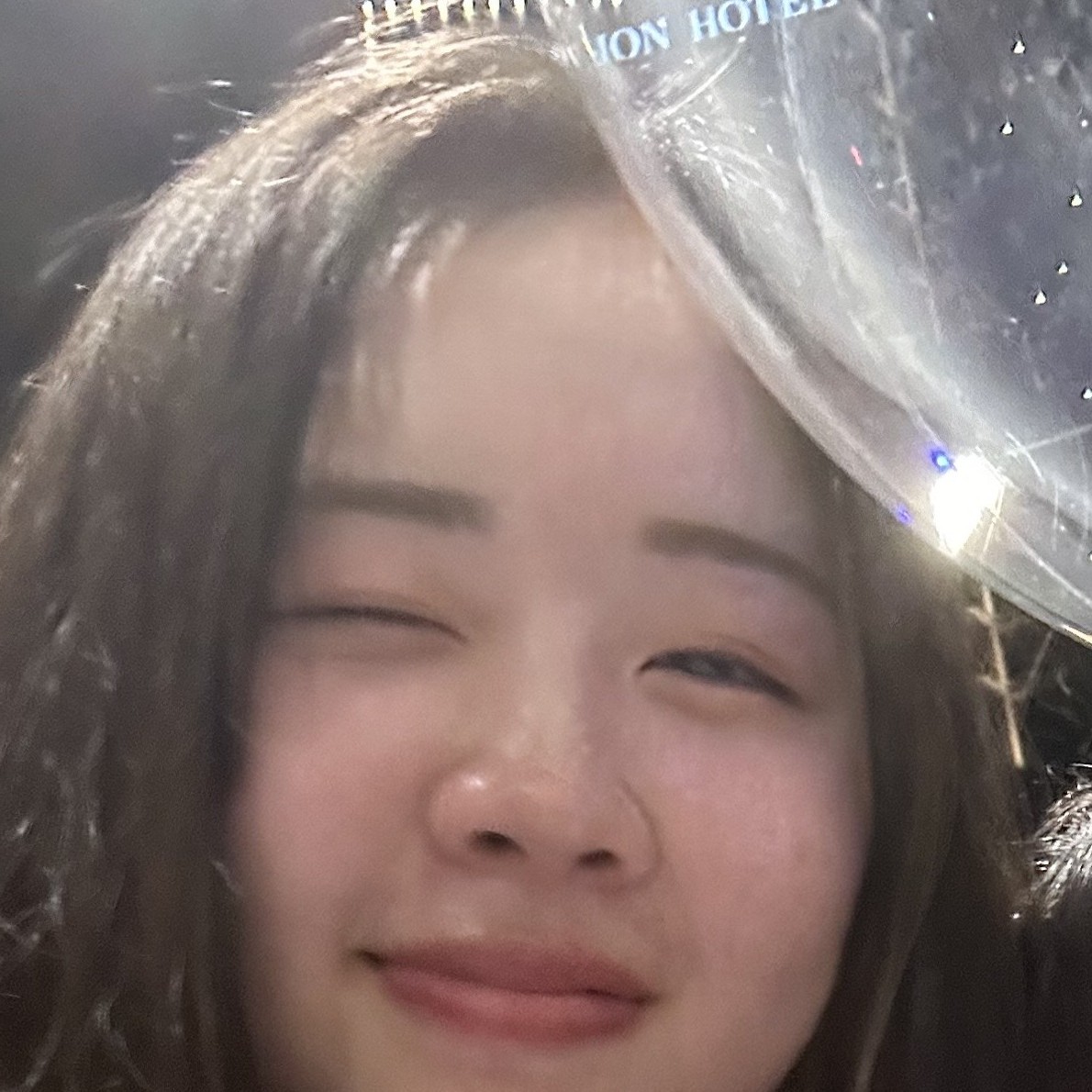
AUASP goes beyond imagination
Miku Yanagibashi (Faculty of International Relations Department of Multicultural Communication)
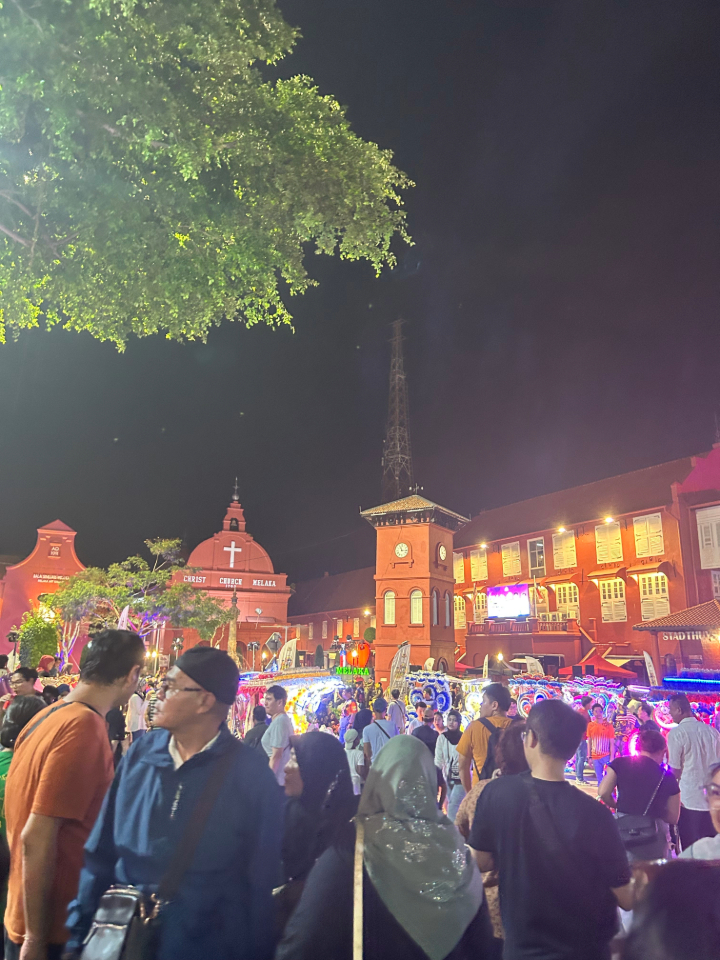
I participated in AUASP and studied abroad in Malaysia for about five months from March 31 to August 24, 2024. Looking back, I feel that participating in AUASP was a very valuable experience that will remain a lifelong memory.
To be honest, I wasn't interested in Malaysia from the beginning. I was originally interested in Northern Europe or Singapore, neither of which were included in the 6-month study abroad program offered by Asia University. My options were AUAP to study in the US or AUASP to study in Malaysia. Although it wasn't Singapore, which was the country I wanted to go to, it was next to Singapore and I thought it would be more interesting to go to Malaysia, where I had no idea what life would be like, rather than the safe option of studying in the US. That's why I chose AUASP.
At UCSI University, located in the suburbs of Kuala Lumpur, I took English classes five times a week with other International Student, and Malaysian Studies classes about Malaysia, such as the Malay language, Malaysian culture, and festivals, about three times a week. The university was filled with not only Malays, but also International Student from various countries, which reminded me that Malaysia is a multi-ethnic country. Everyone had their own native language, and I felt that they used English as a tool to communicate with each other.
To be honest, I wasn't interested in Malaysia from the beginning. I was originally interested in Northern Europe or Singapore, neither of which were included in the 6-month study abroad program offered by Asia University. My options were AUAP to study in the US or AUASP to study in Malaysia. Although it wasn't Singapore, which was the country I wanted to go to, it was next to Singapore and I thought it would be more interesting to go to Malaysia, where I had no idea what life would be like, rather than the safe option of studying in the US. That's why I chose AUASP.
At UCSI University, located in the suburbs of Kuala Lumpur, I took English classes five times a week with other International Student, and Malaysian Studies classes about Malaysia, such as the Malay language, Malaysian culture, and festivals, about three times a week. The university was filled with not only Malays, but also International Student from various countries, which reminded me that Malaysia is a multi-ethnic country. Everyone had their own native language, and I felt that they used English as a tool to communicate with each other.
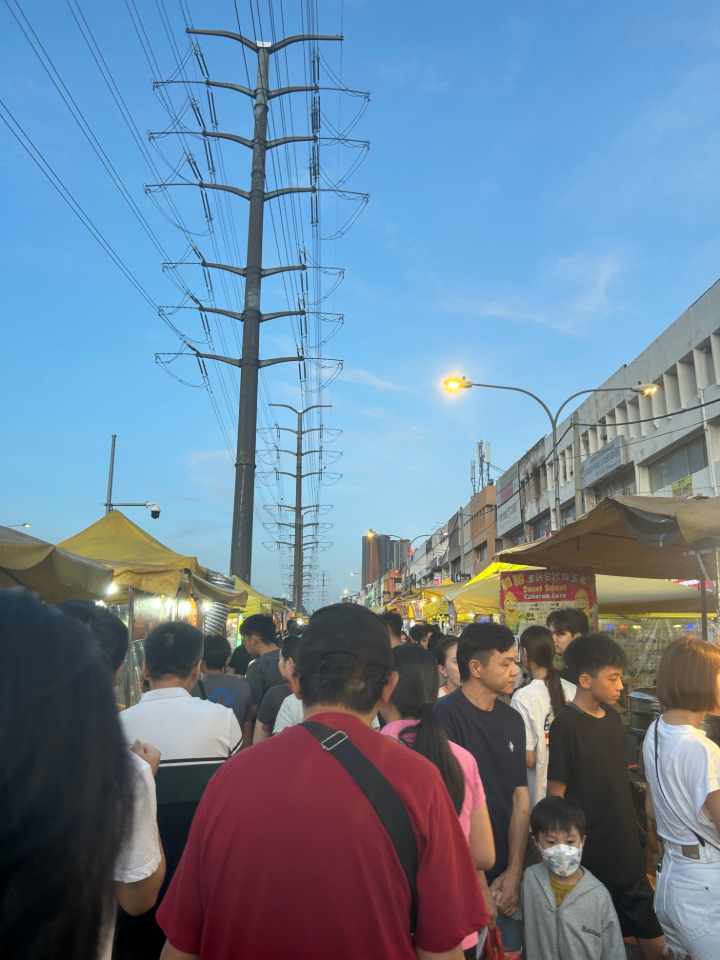
When I first came to Malaysia, I felt shy about speaking English, and I was worried about whether my English would be understood, so I couldn't speak English very proactively. About a week after I came to Malaysia, my classmates called me to talk with them, and I honestly told them, "I'm embarrassed to speak English incorrectly, and I'm worried because everyone is good at English." They told me, "Everyone can't speak English at first, and even if you can't speak well, you'll understand if you keep talking." I thought, "There are no other Japanese people here, so I won't be embarrassed to say anything!" and started talking a lot with my classmates and teachers. When I was talking, there were many times when I thought, "What was that word again?" and I remembered my seniors often saying, "I should have studied English before studying abroad." I realized that this is what I felt at times like this, and that I should have studied more. Over the past five months, when I came across words I didn't understand or expressions I didn't know how to convey, I would break them down in my own way using words I understand, and make sentences and expressions that are easy to understand when I speak to the other person. I feel that this has really helped me develop the ability to think instantly and communicate on the spot when I find myself thinking, "How should I convey this?"
Before participating in AUASP, I knew nothing about Malaysia and its culture, and not many people around me knew about it, so I was excited to see what it was like. It wasn't a country I wanted to go to even before I entered university, but I'm really glad I was able to live in Malaysia, even for just six months, and I really want to go back to Malaysia. Of course, there were some unexpected problems, but at the time I faced them with the feeling that "this isn't Japan, and this is what it's like overseas!" I experienced so many things during these five months that I can't put them all into words.
Southeast Asia is often chosen as a travel destination, but not many people choose to study abroad there. Many people choose America or Europe when studying abroad to learn English, and there isn't much information available, so it may be a little hesitant to choose it. However, since it's a chance to study abroad, I hope you'll jump into Malaysia, a country with many different ethnicities and cultures, interact with many different people, and have a valuable experience.
Before participating in AUASP, I knew nothing about Malaysia and its culture, and not many people around me knew about it, so I was excited to see what it was like. It wasn't a country I wanted to go to even before I entered university, but I'm really glad I was able to live in Malaysia, even for just six months, and I really want to go back to Malaysia. Of course, there were some unexpected problems, but at the time I faced them with the feeling that "this isn't Japan, and this is what it's like overseas!" I experienced so many things during these five months that I can't put them all into words.
Southeast Asia is often chosen as a travel destination, but not many people choose to study abroad there. Many people choose America or Europe when studying abroad to learn English, and there isn't much information available, so it may be a little hesitant to choose it. However, since it's a chance to study abroad, I hope you'll jump into Malaysia, a country with many different ethnicities and cultures, interact with many different people, and have a valuable experience.
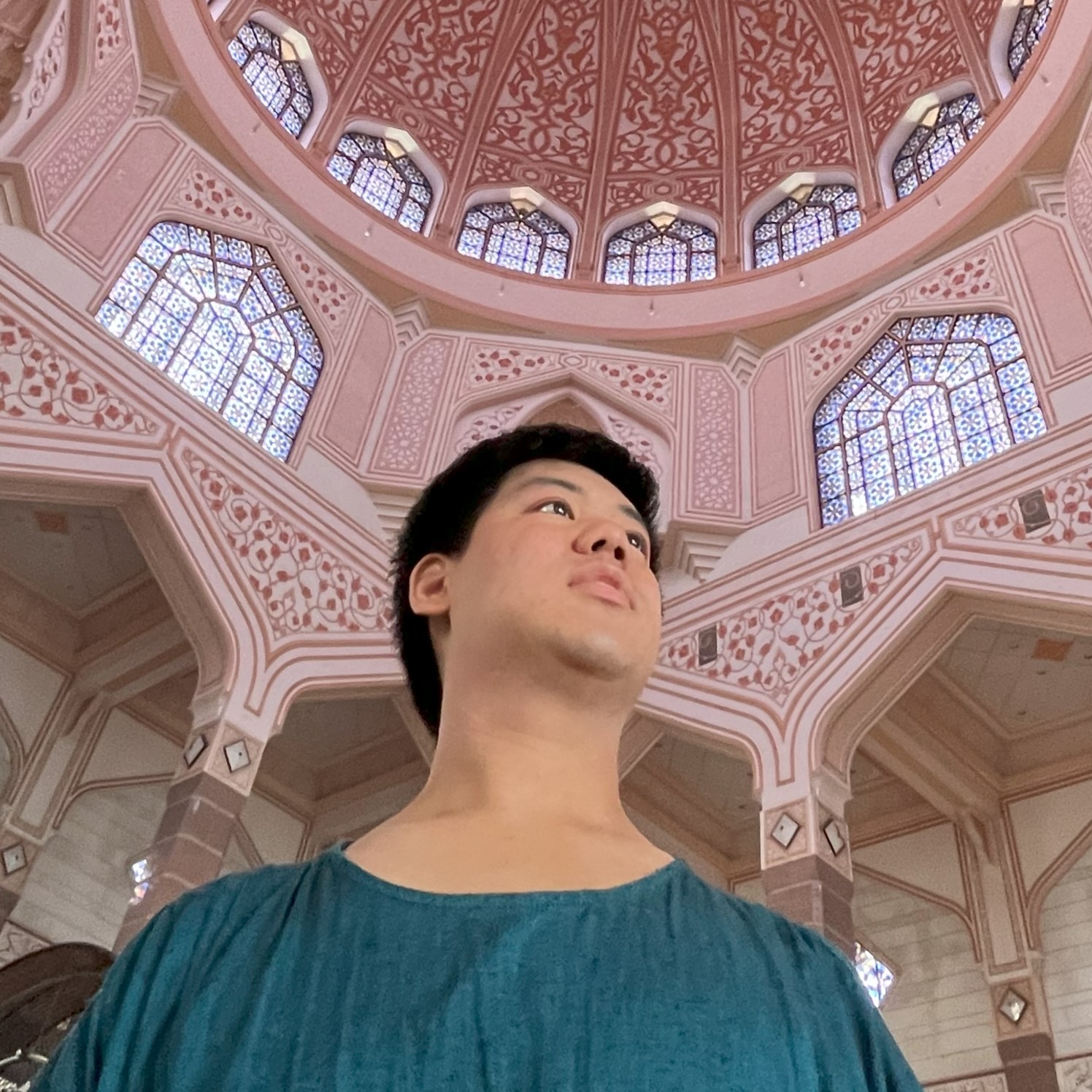
I lived abroad for five months.
TANAKA Shunki (Faculty Faculty of International Relations Department of International Relations)
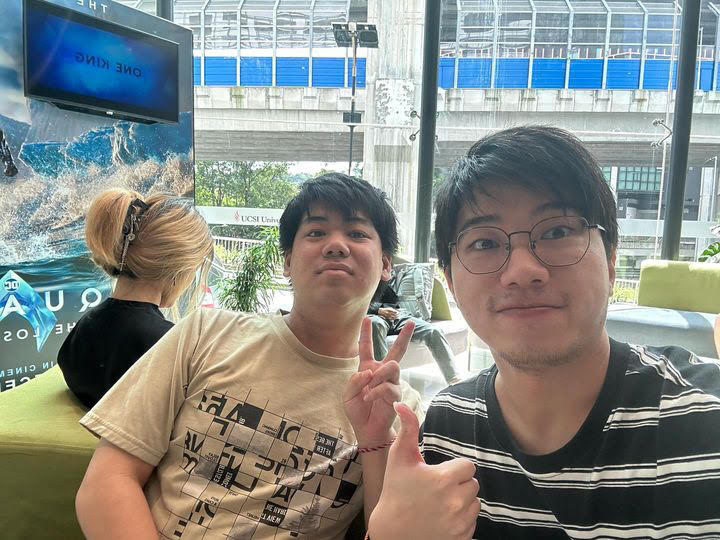
Even before I enrolled in Asia University, I had a strong desire to study abroad when I became a university student. Therefore, I decided to go to Asia University, which has a well-developed study abroad program. When I first enrolled, I wanted to study abroad in the United States with AUAP. The reason is that America is known as a "salad bowl of races," with many people with roots in various countries, such as Africa, Asia, and Europe, and you can communicate in English with people with diverse thoughts. However, I thought that I could do the same thing in Malaysia. In addition to the large number of races, Malaysia has Islam as its official religion, but is very tolerant of other religions, and many people believe in other religions such as Christianity, Buddhism, and Hinduism, so I thought that I would be able to be exposed to more diverse values than in the United States. In addition, I took Indonesian as a second foreign language in my first year, and Indonesian is a language created based on Malay, so I thought that I would be able to use my knowledge of Indonesian as well as English to interact with local people. For these reasons, I decided to study abroad in Malaysia.
Life in Malaysia is completely different from Japan, and every day was fresh and I was able to spend five very fulfilling months. First of all, there is the diversity of religions and races. As mentioned above, Malaysia is a multi-religious and multi-ethnic country, unlike Japan, and even just walking around the dorms or UCSI University, or even just on campus, you can see people wearing hijabs, which Muslim women wear on their heads, and bintis, which are red ornaments worn in the center of Hindu women's foreheads. In terms of language, the official language of Malaysia is Malay, so naturally Malay is written on signs around the city, but English, Chinese, and Arabic are also commonly seen and heard. This climate of a mixture of different cultures was very interesting and fascinating to me. There were also restaurants serving local cuisine from various countries around the dorms and in the cafeteria, and I was excited every day about which restaurant I would go to that day. When I first came to Malaysia, I went to a kebab restaurant three or four times a week. There was a Pakistani restaurant in the school cafeteria that served delicious curry, so I ate there almost every meal for the two months before returning home.
Next, regarding classes, the classes we took during AUASP were "Malaysian Studies," where only Aichi University students learn about Malaysian history, politics, and Malay language, and English classes for IELTS, where we study together with International Student from other countries. In Malaysian Studies, the content of the classes varies greatly depending on the teacher, but some teachers bring Malaysian local sweets every time, and some classes were very interesting, such as a class where we filmed our daily routine in a VLOG style and created a video with a Malay voice. In English classes, students are divided into classes based on their ability, just like in Aichi University classes, and we receive classes from a different teacher every month. Since we take English classes with International Student from various countries, we have many opportunities to learn about their countries outside of class. For example, when I went to visit a Chinese friend's house, I was given a lot of sweets and fruits, but I learned that in China, it is rude to finish the food served at the table, even though it is welcome, because it means that you are not satisfied. In this way, I was able to learn many things that I had not known before, so I had a lot of fun talking to International Student from other countries.
Life in Malaysia is completely different from Japan, and every day was fresh and I was able to spend five very fulfilling months. First of all, there is the diversity of religions and races. As mentioned above, Malaysia is a multi-religious and multi-ethnic country, unlike Japan, and even just walking around the dorms or UCSI University, or even just on campus, you can see people wearing hijabs, which Muslim women wear on their heads, and bintis, which are red ornaments worn in the center of Hindu women's foreheads. In terms of language, the official language of Malaysia is Malay, so naturally Malay is written on signs around the city, but English, Chinese, and Arabic are also commonly seen and heard. This climate of a mixture of different cultures was very interesting and fascinating to me. There were also restaurants serving local cuisine from various countries around the dorms and in the cafeteria, and I was excited every day about which restaurant I would go to that day. When I first came to Malaysia, I went to a kebab restaurant three or four times a week. There was a Pakistani restaurant in the school cafeteria that served delicious curry, so I ate there almost every meal for the two months before returning home.
Next, regarding classes, the classes we took during AUASP were "Malaysian Studies," where only Aichi University students learn about Malaysian history, politics, and Malay language, and English classes for IELTS, where we study together with International Student from other countries. In Malaysian Studies, the content of the classes varies greatly depending on the teacher, but some teachers bring Malaysian local sweets every time, and some classes were very interesting, such as a class where we filmed our daily routine in a VLOG style and created a video with a Malay voice. In English classes, students are divided into classes based on their ability, just like in Aichi University classes, and we receive classes from a different teacher every month. Since we take English classes with International Student from various countries, we have many opportunities to learn about their countries outside of class. For example, when I went to visit a Chinese friend's house, I was given a lot of sweets and fruits, but I learned that in China, it is rude to finish the food served at the table, even though it is welcome, because it means that you are not satisfied. In this way, I was able to learn many things that I had not known before, so I had a lot of fun talking to International Student from other countries.
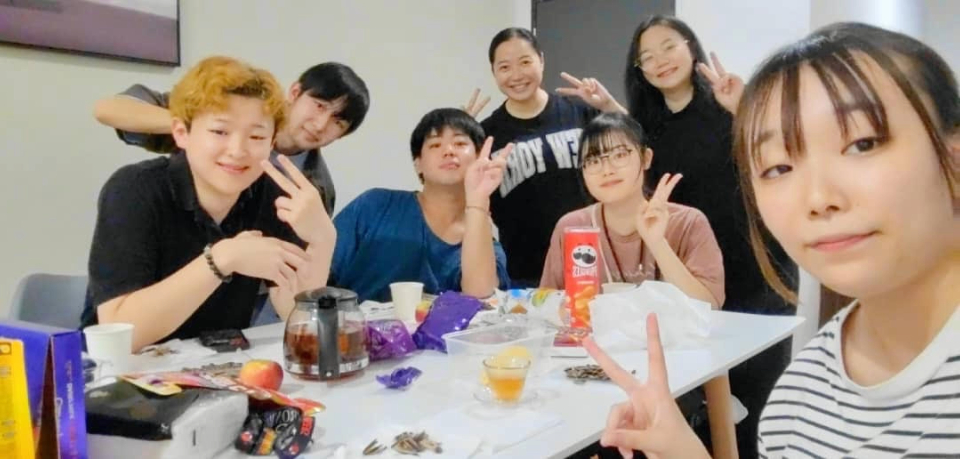
Apart from the dining rules mentioned above, I would like to share some of my most memorable experiences in Malaysia. First, when I ordered a drink at a cafe in the hotel where I was staying, I said "Cold," but the employee told his colleague that I wanted it "Panas (hot)" in Malay. As I mentioned earlier, I was taking Indonesian, and this word was the same as in Indonesian, so I was able to correct it. This was interesting, and at the same time, it was a moment when I felt that even small things I learned were not wasted. Next, interactions with International Student from other countries. Most of my classmates in English class who I talked to on a daily basis were International Student from China. They were very interested in Japan and Japanese people, especially anime and Japanese songs, and when they talked about them, they would listen with a smile and their eyes shining, so I enjoyed talking to them. One of them really liked singing, and the two of us sang "Butter-Fly," the theme song for the anime "Digimon Adventure," Ouyang Feifei's "Love is Over," and Teresa Teng's "Toki no Nagare Mi o Makase." For this reason, people overseas in particular are interested in anime and manga, and some of them know more about them than Japanese people. Therefore, if you have knowledge about Japanese subculture and a wide range of other genres, I think it will be easier to communicate with many people overseas.
Finally, we usually went to a coin laundry near UCSI University to do our laundry. The washing machine and dryer were separate, so our laundry routine was to eat while the laundry was being washed, and then come back when the time was right to dry it. One day, when I washed and returned to dry my laundry as usual, I saw that someone had not done anything even though they knew that the dryer had run out of gas and could not be used, so I called the number written on the coin laundry to have it fixed. At this time, I may not have been able to do anything like the person who was there before, but I think I was able to do this because I was in a situation where I had to do things for myself while studying abroad. Also, as a result of continuing to converse in English with local people and classmates, my speaking and listening skills improved compared to before studying abroad. As for speaking ability, I was able to improve my speaking ability and proactiveness because I had to be creative in communicating what I wanted to do and what I was thinking to the other person even in an environment where there was no one who could speak Japanese. As for my listening ability, when I first arrived in Malaysia I was confused because I couldn't understand what the waiter was saying even when trying to order something at a store. However, towards the end of my study abroad I was able to understand English well enough to be able to have small conversations with waiters at stores and even talk with my English teacher while eating lunch.
Through my five months of studying abroad in Malaysia, the thing I realized most is that you should not compare your new environment with the one you are used to. For example, the place where we lived was in the suburbs of the capital, Kuala Lumpur, and there were no pedestrian signals or crosswalks. Therefore, to cross the road, you must wait for no cars to pass by or express your intention to cross yourself. Also, when getting on a train at a station, in Japan, you wait for people to get off before getting on, but in Malaysia, both people who are getting off and those who are getting on move at the same time. Japanese people may think that it is better to give way to others, but in Malaysia, this is common sense, and foreigners should not give priority to their own country's way of thinking without considering the culture of the place where they are now just because it is different from their own country, so I don't think foreigners should say anything about it. Because I think that if you compare your new environment with your own country or the environment you are used to in that way, you will not be able to see it in the right light. Therefore, when living in a different environment, not only overseas, but also when living in a different environment from your past, it is important to accept it without rejecting it, even if it is something you do not know.
Finally, Malaysia is a country where you can learn English and exchange cultures in an Asian environment that is not only multicultural but also multi-ethnic and multi-religious, unlike Western countries such as the United States. Why not actually step foot in Malaysia and experience Malaysia with your whole body, using your five senses?
Finally, we usually went to a coin laundry near UCSI University to do our laundry. The washing machine and dryer were separate, so our laundry routine was to eat while the laundry was being washed, and then come back when the time was right to dry it. One day, when I washed and returned to dry my laundry as usual, I saw that someone had not done anything even though they knew that the dryer had run out of gas and could not be used, so I called the number written on the coin laundry to have it fixed. At this time, I may not have been able to do anything like the person who was there before, but I think I was able to do this because I was in a situation where I had to do things for myself while studying abroad. Also, as a result of continuing to converse in English with local people and classmates, my speaking and listening skills improved compared to before studying abroad. As for speaking ability, I was able to improve my speaking ability and proactiveness because I had to be creative in communicating what I wanted to do and what I was thinking to the other person even in an environment where there was no one who could speak Japanese. As for my listening ability, when I first arrived in Malaysia I was confused because I couldn't understand what the waiter was saying even when trying to order something at a store. However, towards the end of my study abroad I was able to understand English well enough to be able to have small conversations with waiters at stores and even talk with my English teacher while eating lunch.
Through my five months of studying abroad in Malaysia, the thing I realized most is that you should not compare your new environment with the one you are used to. For example, the place where we lived was in the suburbs of the capital, Kuala Lumpur, and there were no pedestrian signals or crosswalks. Therefore, to cross the road, you must wait for no cars to pass by or express your intention to cross yourself. Also, when getting on a train at a station, in Japan, you wait for people to get off before getting on, but in Malaysia, both people who are getting off and those who are getting on move at the same time. Japanese people may think that it is better to give way to others, but in Malaysia, this is common sense, and foreigners should not give priority to their own country's way of thinking without considering the culture of the place where they are now just because it is different from their own country, so I don't think foreigners should say anything about it. Because I think that if you compare your new environment with your own country or the environment you are used to in that way, you will not be able to see it in the right light. Therefore, when living in a different environment, not only overseas, but also when living in a different environment from your past, it is important to accept it without rejecting it, even if it is something you do not know.
Finally, Malaysia is a country where you can learn English and exchange cultures in an Asian environment that is not only multicultural but also multi-ethnic and multi-religious, unlike Western countries such as the United States. Why not actually step foot in Malaysia and experience Malaysia with your whole body, using your five senses?
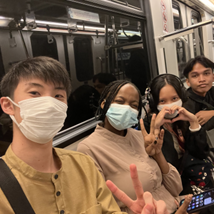
Malaysian experience
OSUGI Akiya (Faculty of Economics Department of Economics)
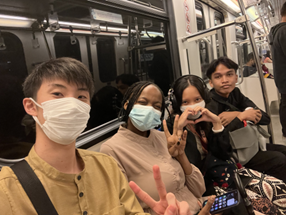 △With friends
△With friendsI am a student in Faculty of Economics, and when I first entered university, I never thought I would go to study abroad. Honestly, I had a fixed idea that it would be difficult to get into the university because my English level was low compared to the people around me in Faculty of International Relations. However, I have always had an interest in foreign countries and wanted to study abroad, so I applied to study abroad even though I had no luck, and that's how I decided to study abroad.
Before I went to study abroad, I took a selection interview, but it was to check whether I had a purpose and intention to study abroad, and it was not to judge whether I had a purpose or intention to study abroad, and not to judge my ability based on my English ability. Although I was relieved that I would be able to study abroad, I also felt sorry for myself for being so anxious about things like this, so I put even more effort into learning English so that I could depart with confidence.
After leaving Japan, the long-awaited campus life in Malaysia began. However, even though I had studied English very hard to make friends in Malaysia, I encountered a huge difficulty and got stuck in my throat when I tried to actually speak, which made me very depressed. Meanwhile, there was a local staff member of the same age as me working at the reception of the hotel I was staying at, and he listened to my concerns and advice, and also gave me a place to practice conversation by inviting my friends over and having me speak English. They provided a lot. While talking with them, what struck me was that they said, ``We sometimes make grammar mistakes, and as long as we use the correct tense and verb, we can get the message across, so don't worry about it.'' For example, when I spoke English without confidence, he told me, ``Be confident, be confident.'' Thanks to their words, I started speaking more proactively without worrying about making mistakes, and more and more English sentences came out of my mouth. Even if you can't formulate a perfect sentence in your head and it ends up being a mess, try just saying the words first, like comedian Tetsuro Degawa. The other person will understand it properly. Also, although you will probably go to study abroad with Japanese friends, I also recommend making local friends instead of just spending time with Japanese people. By making friends, I had the valuable experience of being taken to restaurants that only locals knew about, and visiting their parents' homes. This may happen, so be proactive and talk to them.
Before I went to study abroad, I took a selection interview, but it was to check whether I had a purpose and intention to study abroad, and it was not to judge whether I had a purpose or intention to study abroad, and not to judge my ability based on my English ability. Although I was relieved that I would be able to study abroad, I also felt sorry for myself for being so anxious about things like this, so I put even more effort into learning English so that I could depart with confidence.
After leaving Japan, the long-awaited campus life in Malaysia began. However, even though I had studied English very hard to make friends in Malaysia, I encountered a huge difficulty and got stuck in my throat when I tried to actually speak, which made me very depressed. Meanwhile, there was a local staff member of the same age as me working at the reception of the hotel I was staying at, and he listened to my concerns and advice, and also gave me a place to practice conversation by inviting my friends over and having me speak English. They provided a lot. While talking with them, what struck me was that they said, ``We sometimes make grammar mistakes, and as long as we use the correct tense and verb, we can get the message across, so don't worry about it.'' For example, when I spoke English without confidence, he told me, ``Be confident, be confident.'' Thanks to their words, I started speaking more proactively without worrying about making mistakes, and more and more English sentences came out of my mouth. Even if you can't formulate a perfect sentence in your head and it ends up being a mess, try just saying the words first, like comedian Tetsuro Degawa. The other person will understand it properly. Also, although you will probably go to study abroad with Japanese friends, I also recommend making local friends instead of just spending time with Japanese people. By making friends, I had the valuable experience of being taken to restaurants that only locals knew about, and visiting their parents' homes. This may happen, so be proactive and talk to them.
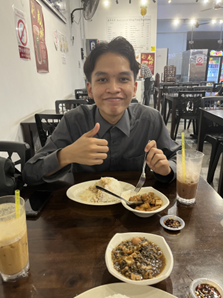 △Malaysia's best friend
△Malaysia's best friendThankfully, I was able to make friends there who I can call my best friends, and I was able to spend a very fulfilling five months there. Of course, there were many difficult times, but I was able to gain valuable experience and learning through this study abroad experience.
I wanted to write about Malaysia's delicious food and tourist attractions in this article, but it would be too long, so I'll stop. If you are interested, please check them out.
For those of you who are thinking about studying abroad, why not consider studying abroad in Malaysia, which has a unique national character, culture, and religion as a multi-ethnic country in Southeast Asia?
Many Malaysian people love Japanese anime and manga, and are very easy to talk to, so I'm sure you'll have a fun time studying abroad.
I wanted to write about Malaysia's delicious food and tourist attractions in this article, but it would be too long, so I'll stop. If you are interested, please check them out.
For those of you who are thinking about studying abroad, why not consider studying abroad in Malaysia, which has a unique national character, culture, and religion as a multi-ethnic country in Southeast Asia?
Many Malaysian people love Japanese anime and manga, and are very easy to talk to, so I'm sure you'll have a fun time studying abroad.

Study abroad in Malaysia for 5 months where every day is fresh
KOBAYASHI Izumi (Faculty of International Relations Department of International Relations)
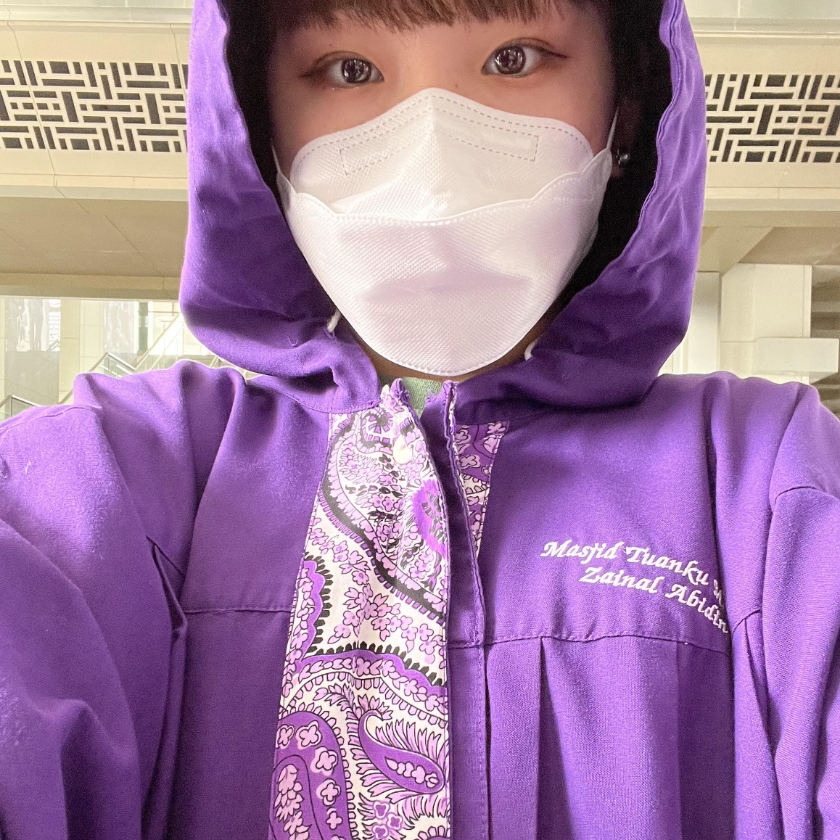
I joined AUASP because I wanted to live in Malaysia, a multi-ethnic country, and learn English in a culture different from Japan. Of course, you don't have to be in Malaysia to learn English, but I was fascinated by learning English in a country like Malaysia, where cultures and religions are mixed.
By actually living in Malaysia, I was able to realize how convenient Japan is with so many options, and I was also able to enjoy the differences in culture and customs between Japan and Malaysia.
For example, if you want to eat vegetables at a Japanese supermarket, you can buy various kinds of vegetables, from raw vegetables to pre-cut vegetables, according to your purpose. Although they have raw vegetables, I was a little confused at first because there were few types and there were no cut vegetables. However, I changed my way of thinking here, and if I wanted to eat vegetables, I tried to substitute vegetable juice instead of raw vegetables, or eat fruits instead. From this experience, I learned that changing the way you think can help you adapt to different cultures and solve problems.
In English classes in Malaysia, students learn the so-called four skills of English, such as grammar and vocabulary. There were some fill-in-the-blank problems in the textbook, just like in English classes in Japan, but learning English in English was very fresh and stimulating for me. In Japan, even if there was something I didn't understand in class, I tended to just ask my friends, but now that I'm studying in Malaysia, I can ask questions in my own words and ask the teacher, "What do you not understand?" I was trying to solve the problem by actively trying to convey it in my own English. For example, when I asked about words with similar meanings and different usages, the teacher who took care of me explained in an easy-to-understand and polite manner, accompanied by example sentences of how to use the words correctly. Also, the teacher who corrected my writing not only corrected my mistakes, but also corrected my paraphrased sentences and appropriate conjunctions. I am very happy that you responded to my question in this way. Through this International Student, my speaking ability has especially improved, and I feel that I am no longer afraid to speak English. Once again, I was able to discover my new strengths.
After International Student Malaysia for 5 months, I became more interested in the culture and religion of Southeast Asian countries. In the future, I would like to work for a Japanese company that is doing business in Southeast Asia. Also, in order not to lose the speaking ability that I improved while studying abroad, I am also considering a job that gives me the opportunity to speak English. The 5 months in Malaysia were the most intense period of my life. No matter what the purpose is, I feel that seeing countries other than Japan with my own feet is an effective way to broaden my horizons, options, and possibilities in the future.
For those of you who are thinking of studying abroad, please study English and have a valuable experience in Malaysia where various races, cultures and religions are mixed!
By actually living in Malaysia, I was able to realize how convenient Japan is with so many options, and I was also able to enjoy the differences in culture and customs between Japan and Malaysia.
For example, if you want to eat vegetables at a Japanese supermarket, you can buy various kinds of vegetables, from raw vegetables to pre-cut vegetables, according to your purpose. Although they have raw vegetables, I was a little confused at first because there were few types and there were no cut vegetables. However, I changed my way of thinking here, and if I wanted to eat vegetables, I tried to substitute vegetable juice instead of raw vegetables, or eat fruits instead. From this experience, I learned that changing the way you think can help you adapt to different cultures and solve problems.
In English classes in Malaysia, students learn the so-called four skills of English, such as grammar and vocabulary. There were some fill-in-the-blank problems in the textbook, just like in English classes in Japan, but learning English in English was very fresh and stimulating for me. In Japan, even if there was something I didn't understand in class, I tended to just ask my friends, but now that I'm studying in Malaysia, I can ask questions in my own words and ask the teacher, "What do you not understand?" I was trying to solve the problem by actively trying to convey it in my own English. For example, when I asked about words with similar meanings and different usages, the teacher who took care of me explained in an easy-to-understand and polite manner, accompanied by example sentences of how to use the words correctly. Also, the teacher who corrected my writing not only corrected my mistakes, but also corrected my paraphrased sentences and appropriate conjunctions. I am very happy that you responded to my question in this way. Through this International Student, my speaking ability has especially improved, and I feel that I am no longer afraid to speak English. Once again, I was able to discover my new strengths.
After International Student Malaysia for 5 months, I became more interested in the culture and religion of Southeast Asian countries. In the future, I would like to work for a Japanese company that is doing business in Southeast Asia. Also, in order not to lose the speaking ability that I improved while studying abroad, I am also considering a job that gives me the opportunity to speak English. The 5 months in Malaysia were the most intense period of my life. No matter what the purpose is, I feel that seeing countries other than Japan with my own feet is an effective way to broaden my horizons, options, and possibilities in the future.
For those of you who are thinking of studying abroad, please study English and have a valuable experience in Malaysia where various races, cultures and religions are mixed!

“Why did you study in Malaysia?”
SUGIMOTO Fu (Faculty of International Relations Department of International Relations)
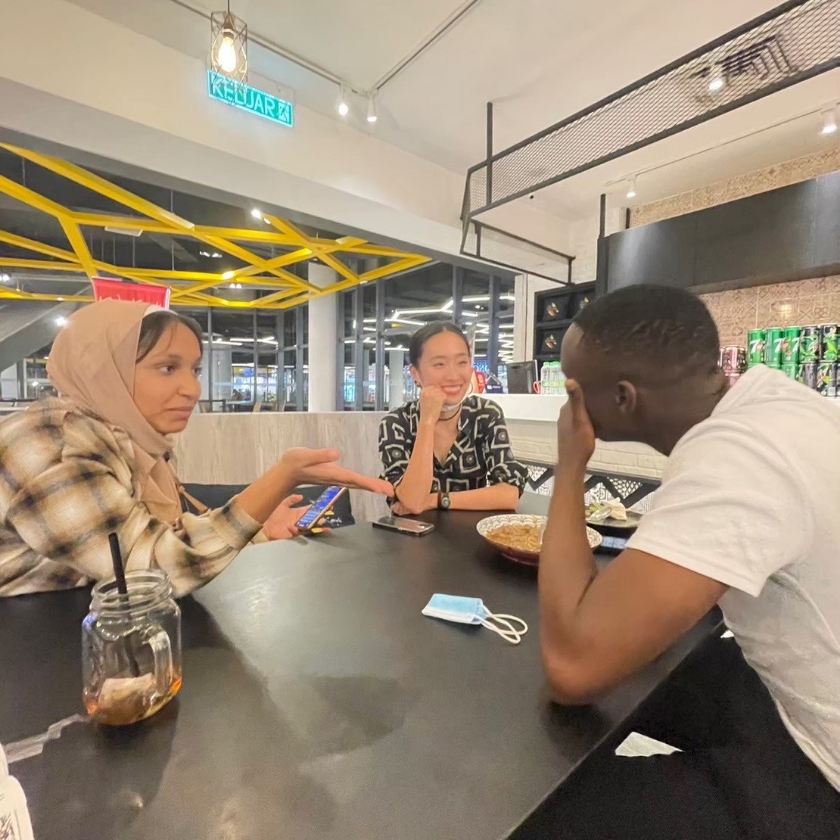
A few days after arriving in Malaysia, I felt frustrated that there weren't many opportunities to converse in English even after classes started, so I and a Japanese International Student talked to various students on campus. I was able to build a wonderful relationship with the friend I talked to on the first day, and I was able to spend a lot of time with him during my study abroad period. For me, who was not good at speaking and acting on my own initiative, the five months of International Student where I was able to challenge myself and continue to make efforts, was an irreplaceable experience. Gradually, I became able to speak English, and the number of people I could interact with increased. I was reminded that this is not the case. International International Student from all over the world come to study in Malaysia not only to improve their language skills and acquire knowledge, but also to the environment in which they are placed in their own country. I was shocked that there was When I learned that I was studying in Malaysia because of the fragility of the country's educational system and political instability, I was able to learn more about the problems occurring in the world that I had only learned about on paper. I was made to recognize again as a serious problem. In Malaysia, a country of diverse races, interacting with international International Student from all over the world was a valuable experience in learning English and broadening my values and perspectives. I also learned that disagreements can arise when you encounter people who live differently and think differently than you. And for the first time, I realized how much fun it is to express one's thoughts until both parties are satisfied and convey them to the other person. Now that I have finished studying abroad, I feel that the tool of "English" expands the range of people I meet, and that is the significance of learning English.
Above all, I am proud that the 10 students from Asia University who were dispatched as the first batch of AUASP students were able to participate in this study abroad program. Sometimes I ran into trouble because it was my first time, and everything didn't go according to plan. I gained a lot of confidence and was able to build strong bonds. Although each person's awareness and purpose of studying abroad is different, I feel that I was able to maintain my own motivation to study abroad by being inspired by the sight of my friends who are doing their best.
Before studying abroad, I had the impression that studying English was difficult, but now I enjoy using English as acommunication tool. In addition, after deciding to study abroad in Malaysia, I feel that each experience I gained through various encounters and events during my five-month International Student in Malaysia has led to my self-confidence. I'm here. I would like to continue to challenge myself with courage while improving my English skills.
Above all, I am proud that the 10 students from Asia University who were dispatched as the first batch of AUASP students were able to participate in this study abroad program. Sometimes I ran into trouble because it was my first time, and everything didn't go according to plan. I gained a lot of confidence and was able to build strong bonds. Although each person's awareness and purpose of studying abroad is different, I feel that I was able to maintain my own motivation to study abroad by being inspired by the sight of my friends who are doing their best.
Before studying abroad, I had the impression that studying English was difficult, but now I enjoy using English as a
<Updated March 4, 2025>